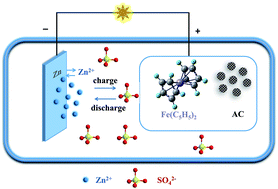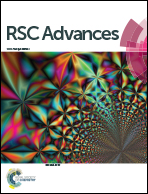Organic–inorganic hybrid ferrocene/AC as cathodes for wide temperature range aqueous Zn-ion supercapacitors†
Abstract
Organic and inorganic materials have their own advantages and limitations, and new properties can be displayed in organic–inorganic hybrid materials by uniformly combining the two categories of materials at small scale. The objective of this study is to hybridize activated carbon (AC) with ferrocene to obtain a new material, ferrocene/AC, as the cathode for Zn-ion hybrid supercapacitors (ZHSCs). The optimized ferrocene/AC material owns fast charge transfer kinetics and can obtain pseudo-capacitance through redox reaction. Due to the introduction of ferrocene/AC, the ZHSCs exhibit remarkable electrochemical performances relative to that using ferrocene cathode, including high discharge specific capacity of 125.1 F g−1, high energy density (up to 44.8 Wh kg−1 at 0.1 A g−1) and large power density (up to 1839 W kg−1 at 5 A g−1). Meanwhile, the capacity retention rate remains 73.8% after 10 000 charge and discharge cycles. In particular, this cathode material can be used at low temperatures (up to −30 °C) with 60% capacity remained, which enlarges the application temperature range of ZHSCs. These results of this study can help understand new properties of organic–inorganic hybrid materials.



 Please wait while we load your content...
Please wait while we load your content...